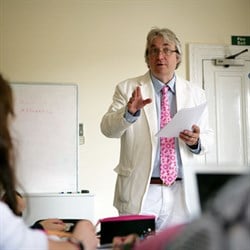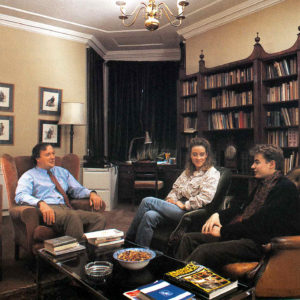Richard Martin’s MPW Memoirs – Part 1
Richard Martin, Head of English at MPW London, has been inspiring students for nearly forty remarkable years. In part one of a two part series, Richard shares his memories of starting out as a fresh faced new teacher in the early years of MPW.
 I first became aware of MPW in my final year at Cambridge. In the pre-internet age there was a quaint system, the ‘milkround’ in which xeroxed rolls appeared in one’s pigeon-hole, filled with the names of companies interested in employing soon to be graduates. I applied but was then told that the outgoing tutor had decided to stay. I promptly forgot about MPW and planned a Ph.D. Fortunately, MPW did not forget about me and I was offered a position teaching English the following year; on the same day coincidentally as I was scheduled to discuss my thesis proposal. The interview went particularly well in the light of the fact that I’d already decided not to accept the university’s offer: the title, ‘Doctor Martin’ would have led, in any case, to endless jokes with a footwear theme.
I first became aware of MPW in my final year at Cambridge. In the pre-internet age there was a quaint system, the ‘milkround’ in which xeroxed rolls appeared in one’s pigeon-hole, filled with the names of companies interested in employing soon to be graduates. I applied but was then told that the outgoing tutor had decided to stay. I promptly forgot about MPW and planned a Ph.D. Fortunately, MPW did not forget about me and I was offered a position teaching English the following year; on the same day coincidentally as I was scheduled to discuss my thesis proposal. The interview went particularly well in the light of the fact that I’d already decided not to accept the university’s offer: the title, ‘Doctor Martin’ would have led, in any case, to endless jokes with a footwear theme.
I began teaching at MPW in September 1984.Orwell’s Nineteen Eighty-Four was the first text I taught. Well, one would remember that.Having taught English at my old college, I pitched my first lesson on the ‘unseen’ component too high. T.S. Eliot’s Anglo-Catholic, high Modernist, Four Quartets might not have been the way to go. I remember my class as forgiving and I adjusted accordingly. I learnt on the job and whereas a three-year doctorate would have seen me narrowly focused on one author my first three years at MPW were spent teaching every text under the sun.
Remember, this was the age of the re-sit, MPW was the king of the re-take, and students on short courses were not always thoughtful enough to have studied texts that were already in one’s repertoire. As every teacher knows the learning never ends. I wandered into the profession with the rather selfish intention of continuing to educate myself and to remain in the closest proximity I could to books, bar becoming a bookseller – this I had been in my gap year. I stayed because I realised (and no one can tell you this) what a pleasure it is to impart knowledge to others. I was mistaken for a student in my first lesson – an error of which there was a rapidly diminishing chance of recurrence. Asked whether I’d met the class tutor, I confidently assured the students that I had indeed done so and that he seemed very nice. I then took register.
 Of Mander, I had no sighting, early or late. The rumour was that he’d done a morning’s teaching, not taken to it and retired to England’s most beautiful house to read Thomas Browne for the rest of his life. This I could relate to, but it was not for me an entirely feasible option. I cannot speak highly enough of Robert Woodward and Rodney Portman. I had more dealings with Robert because in time honoured fashion he’d switched to English in his third year. Robert and Rodney had well-appointed rooms – offices they were not – but were often to be found in the staff room, holding forth on matters literary – officious they were not. The staff room did not feel so different from a Cambridge JCR, so the world of work opened for me without the culture shock others have had to negotiate. Robert reminded me of James Robertson Justice in the ‘Doctor’ film series and his claim that “there are only five things you need to know about Hamlet” was oft -repeated in a booming voice. It was a useful mentality if you were preparing students for November or January exams. Robert who died suddenly in 2008 was a remarkable man, larger than life: rarely are clichés so accurate.
Of Mander, I had no sighting, early or late. The rumour was that he’d done a morning’s teaching, not taken to it and retired to England’s most beautiful house to read Thomas Browne for the rest of his life. This I could relate to, but it was not for me an entirely feasible option. I cannot speak highly enough of Robert Woodward and Rodney Portman. I had more dealings with Robert because in time honoured fashion he’d switched to English in his third year. Robert and Rodney had well-appointed rooms – offices they were not – but were often to be found in the staff room, holding forth on matters literary – officious they were not. The staff room did not feel so different from a Cambridge JCR, so the world of work opened for me without the culture shock others have had to negotiate. Robert reminded me of James Robertson Justice in the ‘Doctor’ film series and his claim that “there are only five things you need to know about Hamlet” was oft -repeated in a booming voice. It was a useful mentality if you were preparing students for November or January exams. Robert who died suddenly in 2008 was a remarkable man, larger than life: rarely are clichés so accurate.
The Arts building was at Wetherby Place; very small by the size of MPW now, its charm in inverse proportion to its lack of corporateness. We did not know an assessment objective from a scheme of work but teaching proceeded along the same lines as it does now in our brave new codified world. I have fond memories of Wetherby Place due primarily to its proximity to the Gloucester Road Bookshop, owned by Graham Greene’s nephew. I remember seeing Francis Bacon on a regular basis making his unsteady way back to Reece Mews from the Hereford Arms. I imagined him in his cups and in his splattered studio, painting his smeared and trapped beings. The Science block at Elvaston Place (the latter being immortalised in an obscure song by Al ‘Year of the Cat’ Stewart) was bigger and hinted at the shape and size of MPW buildings to come. I have no memory of teaching in it in the early days, but I do remember a little satellite building called Adam Court on Gloucester Road. If you go looking for it, it’s between a branch of HSBC and The Stanhope Arms and appears to have been vacant ever since MPW shut up shop there in the late ‘eighties.
Tutors exiled to this outpost of progress would process down Gloucester Road at approximately 8.55, carrying mugs of steaming coffee, made at Wetherby Place. Remember, gentle and bottled water-drinking reader, in those dark ages Starbuck was but a character in Melville’s Moby Dick and Nero a not entirely compos mentis Roman emperor. Where did students sit their exams in that ‘dark abysm of time’? I had all but forgotten a drill hall in Tottenham Court Road. Logistically it seems a nightmare – students and invigilators hacking their way across London – but I remember no incidents to put such a complexion on the case.

